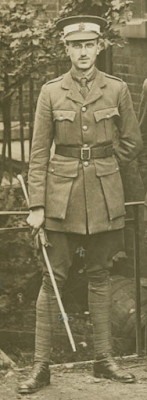 |
| 1916 postcard |
His letters home
also reflected on the ways in which war changes a man: “One is inclined, I
am afraid, to lose perspective very badly, and give no thought to what happens
to anyone save your own little party,” he thoughtfully explained. “You watch
shells bursting over other people’s areas with the most perfect equanimity. As
for the poor Bosch, who gets regularly at least ten to one, he is entirely
beyond the pale of sympathy except at odd and fleeting moments” (McMasterUniversity).
Although perhaps he lacked sympathy for the “poor Bosch,” Trotter’s war-time poetry reveals his optimism and faith, as well as his love of nature and high romance. In August of 1916 as he prepared to leave for France, Trotter composed a poem that tells of the sweet goodbye a soldier happily receives before leaving for war.
A Kiss
--Bernard
Freeman Trotter
She kissed me
when she said good-bye—
A child's kiss, neither bold nor shy.
A child's kiss, neither bold nor shy.
We had met but
a few short summer hours;
Talked of the sun, the wind, the flowers,
Talked of the sun, the wind, the flowers,
Sports and
people; had rambled through
A casual catchy song or two,
A casual catchy song or two,
And walked
with arms linked to the car
By the light of a single misty star.
By the light of a single misty star.
(It was
war-time, you see, and the streets were dark
Lest the ravishing Hun should find a mark.)
Lest the ravishing Hun should find a mark.)
And so we
turned to say good-bye;
But somehow or other, I don't know why,
But somehow or other, I don't know why,
—Perhaps `t
was the feel of the khaki coat
(She'd a brother in Flanders then) that smote
(She'd a brother in Flanders then) that smote
Her heart with
a sudden tenderness
Which issued in that swift caress—
Which issued in that swift caress—
Somehow, to
her, at any rate
A mere hand-clasp seemed inadequate;
A mere hand-clasp seemed inadequate;
And so she
lifted her dewey face
And kissed me—but without a trace
And kissed me—but without a trace
Of
passion,—and we said good-bye…
A child's kiss,…neither bold nor shy.
A child's kiss,…neither bold nor shy.
My friend, I
like you—it seemed to say—
Here's to our meeting again some day!
Here's to our meeting again some day!
Some happier
day…
Goodbye.
Goodbye.
 The poem is saturated in hope and innocence. The sun shines, flowers bloom, and the young
couple “ramble through a casual catchy song or two,” perhaps joining together in
“K-K-K
Katy” or “She Wore it
for a Lover Who Was Far, Far Away.” Her face is dewey, his coat is khaki, and as they linger for a last
evening’s stroll, their arms linked under the light of a “single misty star,” the
young woman is overwhelmed with “a sudden tenderness” that gives way to a
swift, impulsive caress. She quickly
bestows upon the young soldier a kiss, “without a trace of passion.” That impetuous kiss confirms a sweet friendship
and promises a bright future meeting when the world has returned to peace and
sanity.
The poem is saturated in hope and innocence. The sun shines, flowers bloom, and the young
couple “ramble through a casual catchy song or two,” perhaps joining together in
“K-K-K
Katy” or “She Wore it
for a Lover Who Was Far, Far Away.” Her face is dewey, his coat is khaki, and as they linger for a last
evening’s stroll, their arms linked under the light of a “single misty star,” the
young woman is overwhelmed with “a sudden tenderness” that gives way to a
swift, impulsive caress. She quickly
bestows upon the young soldier a kiss, “without a trace of passion.” That impetuous kiss confirms a sweet friendship
and promises a bright future meeting when the world has returned to peace and
sanity.
Although Bernard Trotter wrote “The Kiss” while stationed in England and preparing for war, the poem makes only the briefest nod to the conflict. Within the boundaries of this verse, even the
Hun seems to join in conspiring to support romance, for thanks to the threat of German attack, the streets are lit only by stars. Poetry was able to provide both an
emotional and imaginative escape from the war for both soldiers and civilians.
 |
| Bernard Freeman Trotter |
His father
chose as the inscription for his son’s headstone, “How, dying, smotest thou the
one full chord ere thy lute broke.”

No comments:
Post a Comment